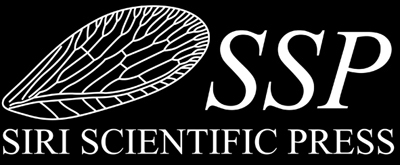News — News
Palaeontological Association Prize Winner
Posted by David Penney on
Congratulations to Max Stockdale of the University of Bristol for winning one of our book tokens for his student talk at the Palaeontological Association Annual Meeting held in December. The book you requested will be winging its way to you shortly. The details of Max's talk are as follows: Phylogeny and macroevolution of crocodylomorphs*Max T. Stockdale1, Michael J. Benton1, Mario Bronzati2, Marco B. de Andrade3 and Gavin T. Thomas41-University of Bristol, UK, 2-Bayerische Staatssammlung für Paläontologie und Geologie, Germany, 3-Pontifícia Universidade Católica do Rio Grande do Sul, Brazil, 4-University of Sheffield, UK ABSTRACTThe Crocodylomorpha present a unique dichotomy in their...
- 0 comment
- Tags: News, Prize winners, Sponsorship
NEVER PAY FULL RRP when you purchase directly from our website
Posted by David Penney on
Siri Scientific Press are pleased to announce that they have adopted the policy of selling all their titles at below the RRP on their website as a thank you to customers who purchase directly from us. We are fully aware that there are many other outlets available for customers who wish to purchase our books, but we are always grateful when customers purchase directly from us. It helps us to produce new and interesting titles more quickly and helps us support our other related activities, including: Sponsoring scientific meetings and offering prizes for new research students Vera Opatova (Czech...
- 0 comment
- Tags: News, Special offer, Store news
16 million-year-old poisonous plant fossilized in amber
Posted by David Penney on
The discovery of the first-ever fossil specimens of an “asterid” flowering plant was published yesterday in the journal Nature Plants. The perfectly preserved fossilised flowers were found in 16 million-year-old Dominican amber and belong to the genus Strychnos, which ultimately gave rise to some of the world’s most famous poisons, such as strychnine and curare. 16 million-year-old Strychnos flower in Dominican amber Researcher George Poinar, Jr., a courtesy professor in the College of Science at Oregon State University, said, “Species of the genus Strychnos are almost all toxic in some way. Each plant has its own alkaloids with varying effects....
- 0 comment
- Tags: New research, News
Palaeontological Association 2015 prize winner for best talk
Posted by David Penney on
Congratulations to Jack Oyston of the University of Bath for winning one of our book tokens for the best student talk at the Palaeontological Association Annual Meeting held in December. The book you requested will be winging its way to you shortly. The details of Jack's talk are as follows: What limits the morphological disparity of clades?*Jack W. Oyston(1), Martin Hughes(2), Peter J. Wagner(3), Sylvain Gerber(4) & Matthew A. Wills(1)1-University of Bath, UK, 2-Natural History Museum, London, UK, 3-Smithsonian Institution, USA, 4-University of Cambridge, UKABSTRACT Variation in form within clades is decoupled from estimates of diversity. Specifically, groups tend to...
- 1 comment
- Tags: Conference, News, Prize winners
British Polacanthid Dinosaurs - Addendum
Posted by David Penney on
As is often the case with published works, some errors do creep in that are not noticed until the book has been printed. The purpose of this blog post is to correct two small errors in our monograph on British Polacanthid Dinosaurs by William T. Blows. Click the cover image to go to the product page But first, a couple of weeks ago I took my daughter to the Natural History Museum in London where she was able to get hands on with spikes, plates and other fossilized elements of these remarkable dinosaurs. If you like dinosaurs then the Natural...
- 0 comment
- Tags: Addendum, Monograph series, News
